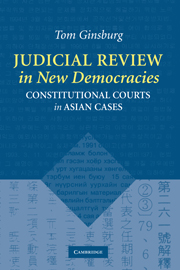Book contents
- Frontmatter
- Contents
- Acknowledgments
- Notes on Usage
- Judicial Review in New Democracies
- Introduction: The Decline and Fall of Parliamentary Sovereignty
- 1 Why Judicial Review?
- 2 Constituting Judicial Power
- 3 Building Judicial Power
- 4 Courts in New Democracies
- 5 Confucian Constitutionalism? The Grand Justices of the Republic of China
- 6 Distorting Democracy? The Constitutional Court of Mongolia
- 7 Rule by Law or Rule of Law? The Constitutional Court of Korea
- 8 Conclusion: Comparing Constitutional Courts
- Bibliography
- Index
Introduction: The Decline and Fall of Parliamentary Sovereignty
Published online by Cambridge University Press: 21 July 2009
- Frontmatter
- Contents
- Acknowledgments
- Notes on Usage
- Judicial Review in New Democracies
- Introduction: The Decline and Fall of Parliamentary Sovereignty
- 1 Why Judicial Review?
- 2 Constituting Judicial Power
- 3 Building Judicial Power
- 4 Courts in New Democracies
- 5 Confucian Constitutionalism? The Grand Justices of the Republic of China
- 6 Distorting Democracy? The Constitutional Court of Mongolia
- 7 Rule by Law or Rule of Law? The Constitutional Court of Korea
- 8 Conclusion: Comparing Constitutional Courts
- Bibliography
- Index
Summary
THE DECLINE OF PARLIAMENTARY SOVEREIGNTY
The idea of the sovereignty of Parliament was long seen as the core of democratic practice. The superior position of the popularly elected legislature and its corollary of majority rule have been central principles for democratic revolutionaries since the notion was appended to the unwritten English constitution. At that time, the threat to liberty was monarchical power, and the subjugation of monarchical power to popular control was the primary goal. The resulting doctrine was that Parliament had “the right to make or unmake any law whatever; and further, that no person or body is recognized by the law of England as having a right to override or set aside the legislation of Parliament.”
In the continental tradition, the intellectual underpinning of parliamentary sovereignty was provided by the Rousseauian concept of the general will. The people were supreme, and their general will as expressed through their republican representatives could not be challenged. This theory, combined with the regressive position of the judicial parlements in the French Revolution, led to a long tradition of distrust of judges in France. The government du juges replaced the crown as the primary threat to popular will in French political thought.
It was natural that the early proponents of democracy supported parliamentary sovereignty. They saw threats to liberty from the traditional sources: the ancien régime, the monarchy, and the church.
- Type
- Chapter
- Information
- Judicial Review in New DemocraciesConstitutional Courts in Asian Cases, pp. 1 - 20Publisher: Cambridge University PressPrint publication year: 2003



